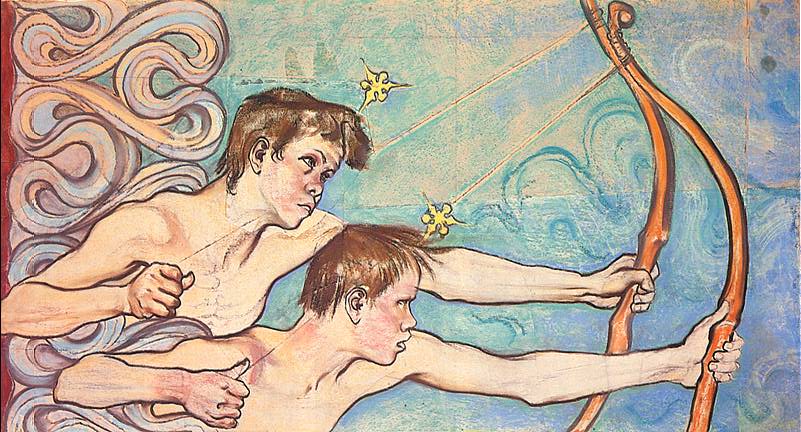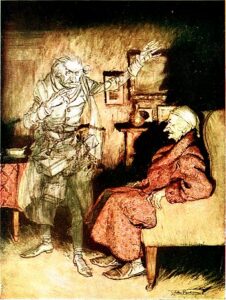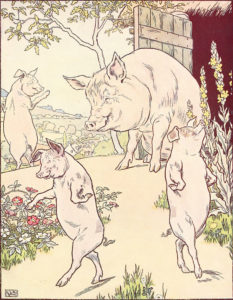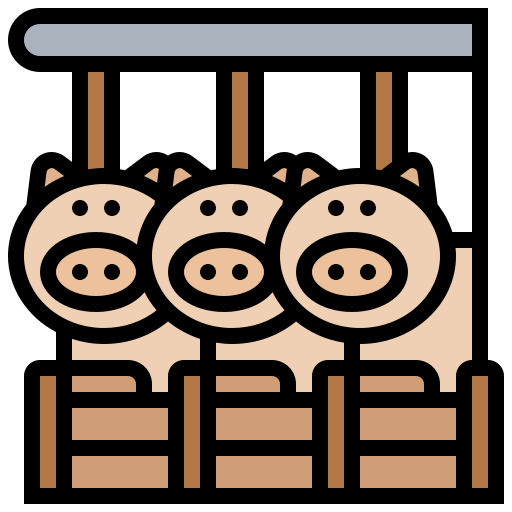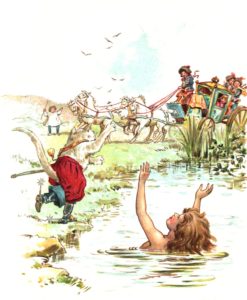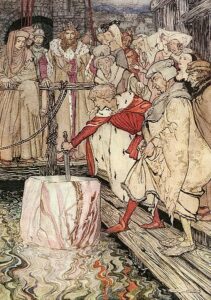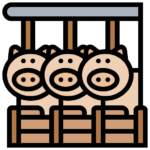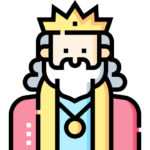
The two brothers – Chapter I
LIRE
A Grimm brothers’ tale developed by Alexandre Dumas. Illustration by Stanisław Wyspiański (1896)
Once there were two brothers, one rich and one poor.
The rich one was a goldsmith and his heart was as hard as the stone on which he touched his gold.
The poor one earned his living by making brooms; this one was good and honest.
The poor man had two children, two sons; the rich man had none.
These two sons were twins and so similar that, in their childhood, their parents had to adopt a sign to recognize them.
They often came and went in the rich man’s house, and sometimes they caught a few crumbs from his table.
Now it happened that the poor man, going one day to the wood to look for heather, saw a golden bird so beautiful that he had never seen one like it.
He picked up a stone, threw it at it, and reached the bird. But, as he had reached the end of the wing, and at the moment when the bird extended this wing to fly away, it fell only a feather. Only, this plain was golden.
The poor broom-maker picked it up and carried it to his brother, who examined it, touched it to the proofstone, and said:
– It is pure gold, without any alloy!
And he gave him a lot of money for his feather.
The next day, the poor man climbed up a birch tree to cut a few birch branches. But the same bird he had seen the day before flew away a second time.
So he carefully searched the tree and found its nest, which contained an egg that was golden, like the bird.
He took this egg home and showed it to his brother, who said to him again:
– It is pure gold and without any alloy!
And he scrupulously gave him the value of it; only he said to him:
– I would like to have the bird itself; I would give you a good price for it.
The poor man went back to the wood the next day and saw the golden bird perched on a tree.
He took a stone, aimed at it as best he could, hit it, and this time killed it stone dead.
The bird fell to the ground. The poor broom-maker picked it up and carried it to his brother.
– Here,” he said, “is the bird you asked for.
The goldsmith gave him twenty gold coins.
The poor broom merchant returned home very happy; he had enough to live on for a year, so he didn’t make a single broom all year long.
The goldsmith was educated and cunning; he knew the legend of the golden bird.
He called his wife and said:
– Roast the golden bird for me and see that nothing is lost. I want to eat it all by myself.
The bird, as you can well imagine, my dear children, was no ordinary bird, and the one who ate its liver and heart was sure to find, every morning when he woke up, two gold coins under his pillow.
The woman arranged the bird properly, skewered it and roasted it.
Now it happened that while the bird was roasting, the woman having been obliged to go out on a necessary errand, the two children of the poor broom-maker came to their uncle’s house, entered the kitchen and, fearing that their uncle’s bird would burn, gave it a few turns on the spit.
And, as the roast was being turned, two pieces of the bird fell into the pan:
– Good! said the older one to the younger one; all that falls in the ditch is for the soldier.
Then each of the two children took a piece and ate it.
Meanwhile, the woman came in and saw them chewing on something.
– What did you eat?” she asked them.
– Two pieces that fell out of the bird’s interior,” they replied.
– It’s the heart and the liver!” the woman exclaimed in fright.
And, so that her husband would not guess, she quickly killed a pigeon, and locked the heart and liver in the golden bird.
As soon as the bird was cooked, she took it to the goldsmith, who ate it whole, leaving nothing; but the next morning, when he visited his pillow to find the two gold coins, to his great astonishment, he found nothing more than usual.
As for the two children, they did not know what happiness had fallen to them. But on the morning after they had eaten the liver and the heart of the golden bird, they got up and dropped something on the ground that rang.
They picked up what had fallen, and it turned out to be two gold coins. They brought them to their father, who was surprised and said:
– How did this happen?
But when the next day they found two more gold coins, and the next day, and the day after that, and so on every morning, the broom merchant went to his brother the goldsmith and told him this strange story.
The goldsmith guessed at once how the thing had happened, and that the children had eaten, one the heart, the other the liver of the golden bird.
And, to take revenge and because he was jealous and cruel, he said to the father:
– Your children are connected with the devil; this gold would bring you misfortune; therefore do not keep them any longer with you: after attacking them, Satan would attack you.
– But what do you want me to do with these two poor innocents, brother?
– Lose them in the forest. If the devil has nothing to do with what happens to them, God will know how to protect them; if, on the other hand, they belong to Satan, well, they will sort out their business with him.
Although it was a great sorrow for him, the poor broom merchant followed the goldsmith’s advice.
He led his children into the woods and left them where the thicket was thickest.
Soon, the two children realized that their father was gone, and, trying to get back to the house, they recognized that they were lost.
The further they walked, the deeper they went into the forest.
They walked all night, calling and shouting, but the only response they got was the howling of wolves, the yelping of foxes, and the cries of hoary cats.
In the morning, at last, they met a hunter, who asked them:
– To whom do you belong, my children?
– Alas! sir,” they replied, “we are the sons of a poor broom-maker, who did not want to keep us in his house because, every morning, we found, my brother and I, a gold coin under our pillow.
– Well,” said the hunter, “it seems to me that there is no great harm in that, if you are honest, and that this gold coin is not the cause of each of you sleeping in the skin of a sloth.
– Sir,” said the two children, “we are honest and do not ask for anything better than to work.
– Well, come with me,” said the good man, “I will be your father and raise you.
And since he had no children, he took them into his home and kept the promise he had made to them.
So they learned to hunt and became the best marksmen in the whole district.
Moreover, as every morning each of the two young men found a gold coin under his pillow, the hunter carefully put this gold coin aside, so that one day, and if necessary, each of them would find his little treasure.
When they were grown up, and their reputation as hunters was made, their foster father took them with him to the woods one day.
– Today,” he said, “each of you is going to shoot your honor shot, so that I can recognize you as hunters and give you your freedom.
And they went together to the lookout.
But they waited a long time; the game did not show itself.
The old hunter looked up and saw a long flock of wild geese flying in the shape of a triangle.
– Come on,” he said to the elder, whose name was Wilfrid, “shoot the goose that is flying at each end.
Wilfrid took aim, fired, and shot the two geese indicated by the foster father.
Thus he had made his coup d’honneur.
A moment later, another flock of geese showed up, flying in a single line.
– Your turn,” said the foster father, addressing the youngest, whose name was Gottlieb, “shoot the first and the last of these geese. And Gottlieb fired twice, and each time shot the designated goose.
He, too, had done his honor.
The foster father said to the two brothers:
– You have finished your apprenticeship as hunters, you are free.
The two young men then stepped away from their foster father and exchanged a few words in a low voice.
Then they returned with him to the house.
But when evening came, and they were called to supper, Wilfrid, speaking for himself and his brother, said to the old hunter:
– Father, we will not touch any food until you have granted us a request.
– And what is this request?” said the old hunter.
Wilfrid answered:
– Now, by your own admission, we have done our apprenticeship as hunters. Now we want to see the world, so let my brother and me go and travel.
No sooner had the old man heard these words than he exclaimed joyfully:
– You speak like true hunters, and what you desire has been my own wish. Go, then, and I predict that good things will come to you.
Then they drank and ate happily. When the day appointed for departure arrived, the old hunter gave each of his adopted sons a good two-shot rifle, and told him to take from the common treasury as many gold coins as he wanted.
Then he went with them a little way; but when he came to the place where he had decided to leave them, he gave them, before taking leave of them, a beautiful knife whose blade was shining and without any stain, and said to them:
– If you must part one day, my dear children, thrust this knife into a tree at the place where the roads will part, and, when one of you returns by that road, he will be able to see how things will have been for his brother, for, if one of the two is dead, the side of the blade facing the road that one has followed will be all rusty, while, on the contrary, as long as you both live, the blade will remain pure and shining.
Wilfrid took the knife; then both of them kissed their foster father and went on their way.
In the evening they came to a forest so large that they did not even think of trying to cross it the same day. So they sat down at the foot of a tree, ate what they had brought in their cart and slept under the stars.
The next day, they started walking again; but even though they did not stop all day, by the evening, at about five o’clock, they had not yet reached the end of the forest.
That day, as the carts were empty, one said to the other:
– We must decide to kill some animal to feed ourselves, or we will have a bad night.
So he loaded his rifle, and beating the brush with his foot, he brought out a hare.
He aimed at the hare and was about to shoot, when the hare called out to him:
– My good hunter, let me live and I’ll give you two rabbits.
It was a bit of a let down for the shadow; but at last the young man trusted the word of the hare, who went back into the wood, and a moment later brought him, indeed, two young hares.
But they were so nice and played so gracefully together, that the hunters could not decide to kill them; so they kept them close to them, and the grateful hares followed them, walking on their heels, like two dogs.
However, it was necessary to eat, and although the two young men had calmed their hunger a little with some sweet acorns, one of them, having made a fox stand up, put him at gunpoint.
But the fox shouted at him:
– Oh! my good hunter, let me live and I will give you two fox cubs.
The hunter thought that two fox cubs would be better to eat than an old fox. He lowered his rifle and signaled his consent to the exchange, and a moment later the fox brought him two cubs.
But, at the moment of killing them, the heart failed the young hunters, and they gave them for companions to the two leopard cubs, being satisfied for their supper with some chestnuts, which they felled from a tree.
Besides, they were determined to kill the first animal they met.
This first animal was a wolf.
One of the two young men was about to kill it, indeed, when the wolf shouted at him:
– Oh, my good hunter, let me live, and I will give you two cubs.
The young men accepted the exchange, and the two cubs were added to the two fox cubs and the two leopard cubs that were already following them.
Then came a bear, who, seeing himself threatened, shouted in haste, like the others:
– Oh! my good hunter, let me live, and I will give you two cubs.
The two cubs were brought and put with the other animals; and, as they were not only the strongest, but also looked big and reasonable, they were charged by the young men to watch over the others.
No sooner had they made this recommendation and entered upon their duties, than a lion advanced towards them, roaring and shaking his mane; but, without allowing themselves to be frightened by these threats, the two hunters aimed at him, and their two shots were about to become one, when the lion, seeing whom he was dealing with, shouted at them:
– My good hunters, let me live, and I will give you two cubs.
And he went and got his cubs, so that the hunters had two lions, two bears, two wolves, two foxes and two hares, which followed them and served them. Only, finding very little to eat in that forest, and getting hungrier and hungrier, they said to the two foxes:
– Let’s see, you who are cunning, can you give us something to eat?
The foxes consulted each other, and after consulting each other:
– ‘Nearby,’ they said, ‘there is a village from which our father and mother used to bring us chickens; we will show you the way.
So the foxes showed the two brothers the way to the village, and they bought food there and gave their animals food, and then they set off again.
The foxes knew of many good chicken coops in the vicinity, and could point them out to the young hunters, who from that moment on, thanks to the foxes, did not have to suffer from hunger.
They traveled in this way for some time, offering their services to the great lords whose castles were on their way; but everywhere they were told:
– We need one hunter, but not two.
So they decided to split up.
They divided the animals among themselves so that each had a lion, a bear, a wolf, a fox and a hare; after which they said goodbye to each other, swearing a brotherly friendship until death.
But before parting, they planted in a tree the knife that their foster father had given them, and Wilfrid took to the east and Gottlieb to the west. Let us follow Gottlieb, the younger of the two, and whose name, my dear children, means loved by God.
FIN
Vous avez repéré une erreur ? N’hésitez pas à nous la signaler en nous écrivant sur cette page
VOUS AVEZ AIMÉ CE CONTE? PARTAGEZ-LE!
AJOUTER AUX FAVORIS
Vous avez aimé ce conte? Ajoutez-le à vos favoris et donnez-lui un like en cliquant le coeur:
CATÉGORIES DU CONTE
Tout savoir sur les Contes de Fées
Avec les clés de lecture
Lisez notre page expliquant l’utilité des Contes de Fées, au niveau intellectuel, émotionnels et des valeurs morales.
Comprendre ce que représente chaque archétype de personnage, bon ou mauvais. L’importance des objets, de la magie, des animaux, etc.
Ajoutez votre version, votre audio ou vos images
Ou publiez votre propre conte
Envoyez-nous votre conte original, votre version ou complétez un conte avec vos illustrations ou un enregistrement audio.

Abonnez-vous à partir de 0,99€ (Promo)
Offre de lancement: Gratuit pour les professeurs
Écoutez les lectures audios en entier
Ajouter des bruitages et musiques de fonds
Garder vos contes favoris et gérer votre liste
Enregistrer vos histoires via l'enregistreur vocal
Accédez aux excercices de français en grammaire, compréhension, rédaction et débats
Télécharger les contes en PDF
Traduire les mots en anglais et améliorer votre français
D’AUTRES CONTES QUI POURRAIENT VOUS PLAIRE:
LE DICTACONTE (BETA)
Instructions
2) Réduisez l’enregistreur pour lire le conte en recliquant sur l’icône en bas de l’écran.
3) Éditez et sauvegardez en recliquant sur en bas.
C'est à vous de lire. Enregistrez-vous!
Vous devez être abonné(e) et connécté(e) pour pouvoir sauvegarder.
Connectez-vous – Abonnez-vous ou tester simplement
ABONNEZ-VOUS




